#best book for python programming
Explore tagged Tumblr posts
Text
It is crucial to learn Python from the best resources available. books are one of the best resources to learn anything so we are going to check out the 5 best Python books for beginners. the episode of this podcast is dedicated to the top 5 Python books to build a strong foundation for beginners.
#best python book for beginners#python programming book#best book for python programming#python programming book for beginners#book for python programming#best book for python programming pdf#latest Python books#free Python books#Python Crash Course#Head First Python#Learn Python the Hard Way#Python Programming An Introduction to Computer Science#Automate the Boring Stuff with Python#best python book for beginners in India#SoundCloud
0 notes
Text
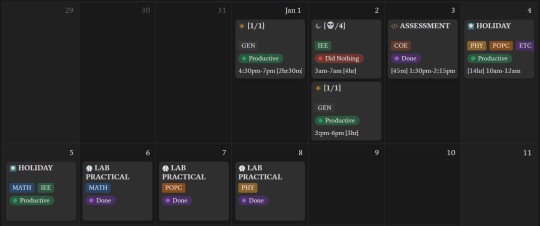


LAB PREP + PRACTICALS WEEK [1st Jan - 9th Jan]
a quick summary!
happy belated new YEARRRR (we're six weeks into the new year time is so slippery and for what T_T)
I finished like 10 pens writing assignments and record books this week and didn't study at all so I failed an html mock assessment thing lol but its cool
the events of each lab: math: it was python, but they taught us jack-shit so I ended up memorizing the programs 2 hours before the lab, and passed with flying colours 👍 there was no viva thank god c lang: they gave us 10 programs to study and I'd actually pre-prepared for this because our professor tricked us into thinking it was a week before. I spent like 20 hours straight learning these programs a week ago and it didn't even happen T_T it went fking amazing though, and so did viva!! I got full marks!! :D physics: studied the experiment write-ups the night before and kind of forgot some of it because the experiment I ended up getting had some heavy content - there were so many tables and so many graphs T_T - I persevered though and breezed through the actual experiment conduction because I'd been teaching it to my lab-mates the past week! I thought my viva went disastrously BUT I passed with a 0.4 deduction only!!
my uni's tea is the best tea 👍
18 notes
·
View notes
Note
Hi! You mentioned there are online tutorials/sites for learning Comp Sci and OSINT - any recommendations? Thanks!
Hi! You got lucky that today is the day I check my inbox lol. So. For comp-sci: - CS50X from Harvard is a public avaiable course on youtube I'd 100% recommend. These are the undedited (so far) lectures of 2024: https://www.youtube.com/watch?v=3LPJfIKxwWc&list=PLhQjrBD2T381WAHyx1pq-sBfykqMBI7V4&ab_channel=CS50
This gives you all the basics you need to understand how coding and pcs in general works. (I had comp sci in my university course)
- Freecodecamp is a website full of FREE tutorials on several programming language. Advice: learn python. You will understand later on.
- The rest really depends on what you actually want to learn and why - each programming language has its own purpose and application. OSINT: -There is this full course: https://www.youtube.com/watch?v=qwA6MmbeGNo&t=205s&ab_channel=TheCyberMentor (But you can find more on youtube.) - Bellingcat's resources: https://www.bellingcat.com/category/resources/ -IntelTecniques: https://inteltechniques.com/ - Osint Newesletter: https://osintnewsletter.com/
But here is the catcher: if you plan to do osint it heavily depends on where you live. I'm in Europe, so it means I'm under GDPR, therefore I must abid to stricter regulations than a US OSINT analyst. A lot of data that might be considered public domain in the US(big one: conviction records) are not in europe, and you won't be able to access it unless you are a registered private investigator at least (but in my case it's rare that I go after people, that's not a part of any task I might encounter at work). Not only that, but a lot of the avaiable tools are designed to work only with specific countries in mind for various reasons and there is a big bias on US-based investigations. If youre' not in the US I recommend you reach out to your local OSINT or cybersecurity professionals association, they usually have resources and specific information, a lot of times for free. Also keep in mind: OSINT has a lot of different applications and it depends on what you're doing with it. Journalists might work more with satellites and images (a thing I know nothing about), debunkers will definitely understand social media more, if you do business intelligence you will look more at news sites, trademarks and deposits and so on to reach your conclusion. You did your course... Now what? I recommend getting on CTFs, like tracelabs that I've linked above, but there many of them (osint dojo for example) or Kase Scenarios. These are safe environments to practice on (except for tracelabs since it deal with actual cases of missing people and it can lead to... not so good leads, allow me to leave it there) You should also understand how intelligence (as the discipline) works. There are several resources, but my favourite is definitely Psychology of Intelligence Analysis. It's a series of declassified training documents from CIA analyst Richard Bauer, that was based on Daniel Kahneman (yes, the "thinking fast and slow" author, and I also do recommend this book) research on euristics. Intelligence is fundamental because OSINT might be helpful to gather the data, but the data then needs to be processed, analysed and you also need to get a conclusion from that analysis. Studying intelligence will help you avoid a lot of pitfalls that happens when you do an investigation, such as not understanding when you know enough, if you're being a victim of your own bias, if you're missing something or if you're going with the right approach. But I have to admit that the best of training I've received so far is from my local OSINT association because I've been able to train with people that work(ed) in the military, get their advice and have a deep understand of the work itself (and the reason why I have decided to actually make cyber threat intelligence my job, even if I work for a private company and I have no interest in working for the government). And yes ethics is a big thing for the OSINT community.
I hope this is helpful enough!
10 notes
·
View notes
Text
I made a character sheet for one of my ocs. Took a lot of bravery to do it, but I made it.🥲 I wasn't sure how to handle the two boxes under the main picture, and I should add that this character is AroAce.🏳️🌈

Metrics explained here:
*Name: Peter Romanov was named purely by his mother. I would go into detail about how his patronymic works but I'm not very sure on how it works in Russian culture, so I'll keep my mouth shut. Anyways, Roman prefers to be called, well, Roman because he despises his first name for some reason.
*Nicknames: If you want to avoid a death glare, call him by Roman or Wolf.
*Race/Species: Before he became the Wolf, he was a first-generation Russian American human. After getting diagnosed with a supposedly rare fatal muscle wasting disease, he secretly began injecting himself with wolf DNA on the genetic level. This was actually working really well...until an assistant startled him during one such procedure and he injected a massive amount into his cells...and mutated into his current state. The unstable state of his cells means that every 5 days, he turns back into a human, and after five days again, he returns to the Wolf, rinse and repeat.
*Age: 30 as of 2024, being born in 1993 after his parents left Russia for the Americas.
*Gender: Born Male, identifies as such.
*Alignment: Wanting to follow the pursuit of knowledge and science for the betterment of mankind, Roman ignores the fact that he was stripped of his license to run a laboratory (after the genetics incident) and continues operating to create new inventions. Problem is, he can't patent them under his own name...
*Class/Job: As stated above, Roman shouldn't be operating a laboratory. He was banned from the high council of intellectuals and was forbidden from ever using their tools to create or invent again. That hasn't stopped him from creating a laboratory from materials gathered on the black market, hiring minions from criminal origins, and operating secretly underneath a normal Pennsylvanian town as a scientist.
*Perception and Communication: He takes advantage of his improved wolf senses to observe every detail around himself. As for communication, he's a great orator and debater, but he can get frustrated if people don't understand his high tech jargon.
*Persuasion and Mediation: He listens well and can use it to his advantage when trying to persuade someone into doing something for him and when mediating an issue between two groups. He's not the best at it, but he's good enough for most scenarios.
*Literacy and Creativity: Raised by a genius mother who noticed that her child's intellect was increasing at an abnormally fast pace, she opted to guarantee that his childhood was to be surrounded by folklore, documentaries, and educational materials. This led to a man that could be omnidisciplinary in Engineering, Robotics, programming (Python/HTML/C++), Physics, Chemistry, Biology, Genetics, mathematics, and neurology. Not surprising for an IQ that reached 300 at 16 years old. (he refuses to do actual medicine though.) He also grew up speaking English and Russian at home.
*Cooking: He can bake, but actually making original meals is kinda hard for him. Especially as the Wolf, because it's led to him just settling for any food with meat in it, even if it's raw.
*Tech Savvy: From as young as 4 years old, he was fixing phones and taking apart cars.
*Combat: Roman took martial arts classes at 16, but rarely uses what he's learned. Especially after becoming the Wolf, because now he has boosted strength that allows him to easily knock out people with a punch or throw them. Not very good with guns either.
*Survival: He learned basic survival skills from the numerous books he's read, but has never really exercised it or gone camping to hone it. As the Wolf, he does have some natural instincts that help.
*Stealth: Ugh. He's never had a reason to be stealthy as a human. This worsened when he turned into a hybrid, because his clunky, furry body is harder to hide. Being 6 ft 7 inches in Wolf form doesn't help.
*Street smarts: Roman has never known a normal childhood due to his rapidly increasing intelligence netting him media attention and breezing him through school. Therefore, he's never been able to make friends with kids his age, and his overprotective parents kept him from exploring the world, leading to his street smarts being shockingly low.
*Seduction: No...just...no.
*Luck: Not anymore or less lucky than a normal person.
*Handling Animals: When in Wolf form, it's very difficult to handle animals without them freaking out on him. In human form? Animals love him.
*Pacifying Children: He's good at distracting kids with a story or a piece of candy, but his stronger senses mean that a child crying is painful to listen to.
*Strength: Probably due to his wasting disease, he's weaker in human form, (as in, weaker than the average human), but notoriously strong as a Wolf.
*Dexterity: Pretty average. Struggles in Wolf form due to not being used to the big furry paws.
*Health: As mentioned before, weak in human form, strong and vibrant in Wolf-man form.
*Energy: Usually in the middle.
*Beauty: Considered handsome in human form. Considered cute fluffy doggo in Wolf form.
*Style: While he's usually in a lab coat, whenever he ventures into the town, he's wearing designer clothes that fit his Wolf form well.
*Hygiene: So for some reason, Wolf still has human lymph nodes in the usual spots, meaning that he also sweats from those areas. So he has to shower daily or else he develops a pretty wild smell.
*Intelligence: From the age of 2, Roman's brain suddenly developed at an insanely fast speed. Nobody knows why this happened exactly, but they had no choice to accept it as Roman began to pass classes flawlessly, finish entire novels in hours, and do complex equations by himself. He's graduated highschool by the age of 12 and helped teach college classes at the age of 15.
*Happiness: Despite his current situation, he's really good at seeing the bright side of things. Roman actually enjoys being in his Wolf form, and feels more free now that the council isn't constantly watching over his back.
*Spirituality: Raised Christian, Roman became agnostic around his pre-teens, and had stayed that way since.
*Confidence: He's very confident in his skills, but not to the point where he thinks he's infallible.
*Humor: His humor tends to vary greatly. While he doesn't make jokes himself, he does find other people's jokes and references entertaining.
*Anxiety: Like with the Happiness stat, Roman doesn't let much get to him. His Wolf affliction actually saved his life, as it stopped and partially reversed the progression of the wasting disease, leading him to be relatively positive.
*Patience: He's learned to be patient with the average person since they can't make hundreds of calculations a minute in their brain like he can, though it does have limits if he can tell if someone is intentionally trying to be an obstacle in his mission.
*Passion: Developing his love for science from his mother, Roman wants a world that is as free from suffering as humanly possible, and he will invent and create as much as he can.
*Charisma: While he gives off a cool and professional aura, his social development was still stunted by his strange childhood.
*Empathy: He can feel like other people, but he sometimes thinks that other people blow things out of proportion, or can solve their problems more easily than they think.
*Generosity: Gives to those that severely need it, doesn't give to much of anyone else.
*Wealth: How does Roman fund a laboratory and a couple dozen minions? Hacking banks obviously. He's good enough that the possibility of police discovering that it's him doing it is so unlikely it's insane, and he usually steals enough that it can pay the bills and all of his minions while still having some left over for leisurely pursuits.
*Aggression: He can be fierce when he needs to be, but prefers giving off a stoic energy usually.
*Libido: Never had much of one at all. Being aromantic asexual helps in making sure that this isn't ever an issue he needs to care about anyway.
I'll add more later, but I'm tired and it's getting late.
#oc art tag#Oc#oc artwork#oc: Roman#wolf#sfw furry#furry#furry art#furry oc#asexual#aroace#wolf art#russian#russian american#oc lore#worldbuilding#lore
14 notes
·
View notes
Text
The 10 Most Anticipated TTRPGs For 2024!
EN World's annual vote on the most anticipated titles of the coming year, and yes, some games have appeared on this list in previous years.
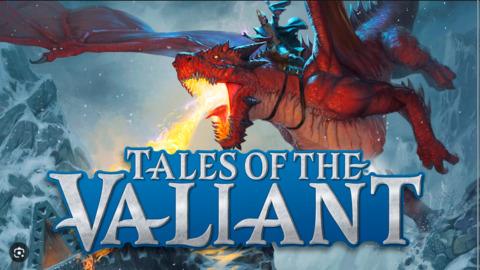
10 Tales of the Valiant (Kobold Press)
1st appearance Kobold Press joins the 'alternate 5E' club with this rewritten, non-OGL version of the game! A million dollar Kickstarter last year, and a new one for the GM's book going on right now, Kobold Press announced this as 'Project Black Flag' during the OGL crisis of 2023, but being unable to trademark that name opted for Tales of the Valiant instead. The system, however, is still called the Black Flag Roleplaying System.

9. Mothership 1E (Tuesday Night Games)
3rd appearance On this list three years running, the boxed Mothership 1E game should be coming out this year! This is sci-fi horror at its best -- you can play scientists, teamsters, androids, and marines using the d100 'Panic Engine'. Yep, it's Alien(s), pretty much.
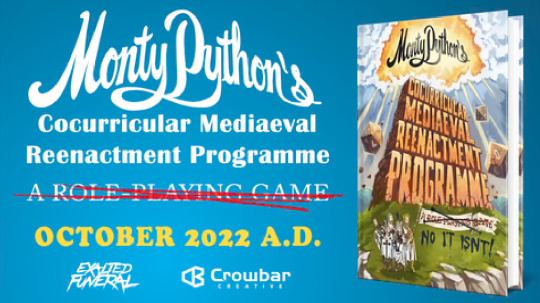
8. Monty Python's Cocurricular Mediaeval Reenactment Program (Exalted Funeral)
2nd Appearance Exalted Funeral made quite a splash when they announced this game last year, which went on to make neary $2M on Kickstarter. And how could they not? It's Monty Python fergoodnessake! A rules-lite gaming system, spam, a minigame with catapults, spam, coconut dice rollers, spam, and an irrepressible Python-eque sense of humour. Did I mention the spam? It was at #10 on this list last year, but it's claimed to #8 this year.

7. Daggerheart (Darrington Press)
1st appearance From the Critical Role folks, Daggerheart is a new fantasy TTRPG with its own original system coming out this year with "A fresh take on fantasy RPGs, designed for long-term campaign play and rich character progression."

6. Cohors Cthulhu (Modiphius)
1st appearance It's Ancient Rome. It's Cthulhu. It uses Modiphius' in-house 2d20 System. You can be a gladiator, a centurion, or a Germanic hero. Did I mention Cthulhu?
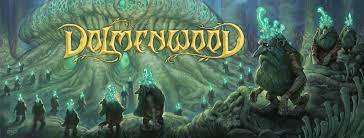
5. Dolmenwood (Necrotic Gnome)
1st appearance The British Isles, a ton of folklore, and a giant Kickstarter--Dolmenwood is a dark, whimsical fantasy TTRPG drawing from fairy tales and lets you "journey through tangled woods and mossy bowers, forage for magical mushrooms and herbs, discover rune-carved standing stones and hidden fairy roads, venture into fungal grottoes and forsaken ruins, battle oozing monstrosities, haggle with goblin merchants, and drink tea with fairies."

4. Pendragon 6E (Chaosium)
4th appearance Last year's winner was on this list waaaaay back in 425 AD, and it's still here! Well, maybe not that far back, but it's shown up in 2021 at #4, 2022 at #3, 2023 at #1, and now 2024 at #4! What can we say? People are clearly anticipating it... still.
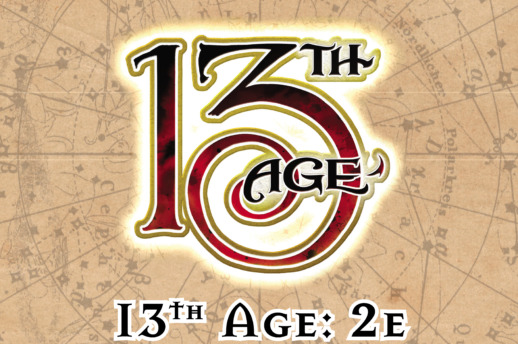
3. 13th Age 2nd Edition (Pelgrane Press)
2nd appearance 13th Age is over a decade old now, and was our most anticipated game way back in 2013. Now the new edition is coming! It's compatible with the original, but revised and with a ton more... stuff! 13th Age 2E was #3 in last year's list!
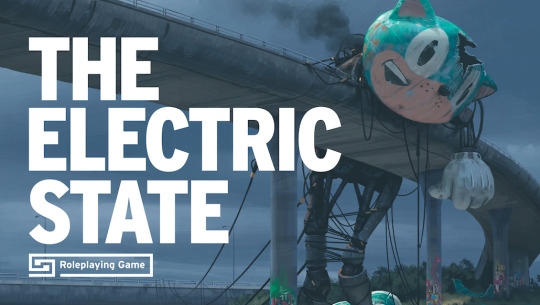
2. The Electric State Roleplaying Game (Free League)
1st appearance Free League is always on these lists, and for good reason. This gorgeous looking game is described as "A road trip on the verge of reality in visual artist and author Simon Stålenhag's vision of an apocalyptic alternate 1990s".

1. Shadow of the Weird Wizard (Schwalb Entertainment)
3rd appearance First announced by Rob Schwalb a couple of years ago, this is a more family-friendly version of his acclaimed RPG, Shadow of the Demon Lord. SHADOW OF THE WEIRD WIZARD is a fantasy roleplaying game in which you and your friends assume the roles of characters who explore the borderlands and make them safe for the refugees escaping the doom that has befallen the old country. Unsafe are these lands: the Weird Wizard released monsters to roam the countryside, cruel faeries haunt the shadows, undead drag themselves free from their tombs, and old, ancient evils stir once more. If the displaced people would rebuild their lives, they need heroes to protect them. Finally at the top of the list after being #7 in 2022, and #6 in 2023!
#RPG#Tales of the Valiant#Mothership#Monty Python#Daggerheart#Cohors Cthulhu#Dolmenwood#Pendragon#13th Age#The Electric State#Shadow of the Weird Wizard
29 notes
·
View notes
Text
Very beautiful! Very Powerful!
MINORS: This place is not a place of honor. No highly esteemed deed is commemorated here. Nothing valued is here.
Thought I’d make one of these pined post things to introduce myself.
My name is Solanum, but you can call me Sol or Lump (or Sol Badgal if you’re epic)
I’m a 24 year old ginger, use it/she (they/them or neopronouns ok but not preferred), simultaneously demiromantic and polyamorous, exist in an asexual quantum superposition, and am bi/pan. Most importantly, I am also a fish
I have a degree in Physics with plans to go into a PhD program for research Astronomy. My area of focus is galaxy structure, formation, and evolution. I’m currently working on my first research papers, adapting my undergraduate thesis work into proper astronomy journal form. I love doing physics and take requests for calculations, stupid or serious (check “#lump’s calculations” for those I’ve done so far, these are my best posts by far).
Outside of research, work, and classes I can usually be found gaming, playing MTG, or putting way too much effort into my shitposts while watching something on my second monitor.
I can be found on a few other sites under the same username but am only active here, and if any mutuals want to connect on discord or steam dm me
If you take one thing away from reading this it’s GO PLAY OUTER WILDS RIGHT NOW. Do not look up anything about it, just play the game and then get your friends to play it. Then we can all talk about it. Please, I need to talk about this masterpiece with more people.
Now that you’ve learned about me I have gained access to your walls. Don’t worry, all I do is nibble a bit of drywall from time to time.
Too many fun facts below
My personal motto is: “The universe is scary and so much bigger than any of us can comprehend, so it’s our duty to fag it up as much as possible”
My plushies names: -Tofrug: Lord Squishers -Manatee: Weapon of Lettuce Destruction -Reimu Fumo: Air Fried Bastard -Hydreigon: Hans -Vaporeon: Dihydrogen Monoxide Puppy -Meowscarada: Greenfield -Reshiram: Nuclear Mommy -Gardevior: Horizon -Blåhaj: Jimbei -Gobbo Bard: Ga Bu
I love nature, and evergreen forests in particular. I enjoy hiking and mushroom and berry picking. Here’s a big cluster of morels I found


Here’s an overabundance of my personal top 3′s, not necessarily the three I think are best (except Outer Wilds, that’s best thing humanity has produced).
Games: Outer Wilds, FFXIV, Ori and the Will of the Wisps Manga: One Piece, Jojo’s Bizarre Adventure, Dungeon Meshi Books: Red Rising, Percy Jackson, A Song of Ice and Fire Movies: Monty Python and the Holy Grail, The Secret of Kells, Hundreds of Beavers Shows: Orb: On the Movements of the Earth, Mob Psycho 100, Ya Boy Kongming! Characters: Mr Torgue Highfive Flexington, Kronk, Nico Robin Mountains: Mt. Hood, Sierra de la Laguna, Mauna Kea Flying Critters: Giant Golden-Crowned Flying Fox, Pelican, Toucan Landbound Creatures: Red Panda, Jumping Spider, Goliath Frog Marine Animals: Sea Lion, Lumpfish, Giant Pacific Octopus Pokemon: Gardevoir, Hisuian Goodra, Zekrom Soundtracks: FFXIV, Made in Abyss, Wildfrost Albums: Starship Velociraptor, Everything Ends (Materia), Westwinds (The Real McKenzies) Foods: Cottage Pie, Khao Soi, my dad’s Chile Verde Fruit: Mexican Pitaya, Atemoya, Mango, Huckleberry Galaxy Clusters: Abell 0209, Abell 1689, macs0416
Cool galaxy pics I took with my university’s telescope


These two are the same, just with different color balancing


100 notes
·
View notes
Text
Hot take : books have too many words
Now that I have your attention, I'm talking about instructional books. Non-fiction books with the purpose of teaching a skill.
Representative example : Automate The Boring Stuff With Python by Al Sweigart. Ostensibly, this is an application-(pun intended)-forward approach to teaching/learning how to program.
Guess on what page, excluding indexes, excluding the forward, you're asked to actually write a single program.
Page 56. Question 9 of the practice questions on the final page of chapter two. And it's a simple if, elif, else decision tree. I bought this book used and the previous owner stopped bookmarking and highlighting on page 41. They didn't write a single line of code themselves.
This isn't a problem unique to this book, it's a criticism I have of most books like this. My criticism of this book is in how similar it is to every other programming book for beginners. But this isn't just true of this domain, it's true of music, it's true of drawing, it's true of painting, it's true of creative writing, second languages, any skill you can learn. I've spent the last year and a half just trying to learn how to do new things as an adult and it's been more and more of this schlock.
I am a firm and committed believer in books, and I think digital learning tools are at best a poor substitute in a pinch. But this is not the way.
Fact of the matter is that humans are really bad at high-level concepts. We are bad at making them, we are bad at communicating them, and we are bad at learning them and drawing conclusions from them. So many highly educated people I know in my field are dumb as rocks because of this.
Learning a new skill happens from repetition. It's a training regimen that involves frequent direct instruction, but it should be at least 50% training.
Imagine if I were your personal trainer (gym) and our first week I just spent every day talking about proper form, nutrition, muscle groups, etc., without you actually doing anything. It may or may not be useful information but you won't have retained much and you wouldn't have grown at all in your fitness!
Gotta put my money where my mouth is and write books...
3 notes
·
View notes
Text
Normally I just post about movies but I'm a software engineer by trade so I've got opinions on programming too.
Apparently it's a month of code or something because my dash is filled with people trying to learn Python. And that's great, because Python is a good language with a lot of support and job opportunities. I've just got some scattered thoughts that I thought I'd write down.
Python abstracts a number of useful concepts. It makes it easier to use, but it also means that if you don't understand the concepts then things might go wrong in ways you didn't expect. Memory management and pointer logic is so damn annoying, but you need to understand them. I learned these concepts by learning C++, hopefully there's an easier way these days.
Data structures and algorithms are the bread and butter of any real work (and they're pretty much all that come up in interviews) and they're language agnostic. If you don't know how to traverse a linked list, how to use recursion, what a hash map is for, etc. then you don't really know how to program. You'll pretty much never need to implement any of them from scratch, but you should know when to use them; think of them like building blocks in a Lego set.
Learning a new language is a hell of a lot easier after your first one. Going from Python to Java is mostly just syntax differences. Even "harder" languages like C++ mostly just mean more boilerplate while doing the same things. Learning a new spoken language in is hard, but learning a new programming language is generally closer to learning some new slang or a new accent. Lists in Python are called Vectors in C++, just like how french fries are called chips in London. If you know all the underlying concepts that are common to most programming languages then it's not a huge jump to a new one, at least if you're only doing all the most common stuff. (You will get tripped up by some of the minor differences though. Popping an item off of a stack in Python returns the element, but in Java it returns nothing. You have to read it with Top first. Definitely had a program fail due to that issue).
The above is not true for new paradigms. Python, C++ and Java are all iterative languages. You move to something functional like Haskell and you need a completely different way of thinking. Javascript (not in any way related to Java) has callbacks and I still don't quite have a good handle on them. Hardware languages like VHDL are all synchronous; every line of code in a program runs at the same time! That's a new way of thinking.
Python is stereotyped as a scripting language good only for glue programming or prototypes. It's excellent at those, but I've worked at a number of (successful) startups that all were Python on the backend. Python is robust enough and fast enough to be used for basically anything at this point, except maybe for embedded programming. If you do need the fastest speed possible then you can still drop in some raw C++ for the places you need it (one place I worked at had one very important piece of code in C++ because even milliseconds mattered there, but everything else was Python). The speed differences between Python and C++ are so much smaller these days that you only need them at the scale of the really big companies. It makes sense for Google to use C++ (and they use their own version of it to boot), but any company with less than 100 engineers is probably better off with Python in almost all cases. Honestly thought the best programming language is the one you like, and the one that you're good at.
Design patterns mostly don't matter. They really were only created to make up for language failures of C++; in the original design patterns book 17 of the 23 patterns were just core features of other contemporary languages like LISP. C++ was just really popular while also being kinda bad, so they were necessary. I don't think I've ever once thought about consciously using a design pattern since even before I graduated. Object oriented design is mostly in the same place. You'll use classes because it's a useful way to structure things but multiple inheritance and polymorphism and all the other terms you've learned really don't come into play too often and when they do you use the simplest possible form of them. Code should be simple and easy to understand so make it as simple as possible. As far as inheritance the most I'm willing to do is to have a class with abstract functions (i.e. classes where some functions are empty but are expected to be filled out by the child class) but even then there are usually good alternatives to this.
Related to the above: simple is best. Simple is elegant. If you solve a problem with 4000 lines of code using a bunch of esoteric data structures and language quirks, but someone else did it in 10 then I'll pick the 10. On the other hand a one liner function that requires a lot of unpacking, like a Python function with a bunch of nested lambdas, might be easier to read if you split it up a bit more. Time to read and understand the code is the most important metric, more important than runtime or memory use. You can optimize for the other two later if you have to, but simple has to prevail for the first pass otherwise it's going to be hard for other people to understand. In fact, it'll be hard for you to understand too when you come back to it 3 months later without any context.
Note that I've cut a few things for simplicity. For example: VHDL doesn't quite require every line to run at the same time, but it's still a major paradigm of the language that isn't present in most other languages.
Ok that was a lot to read. I guess I have more to say about programming than I thought. But the core ideas are: Python is pretty good, other languages don't need to be scary, learn your data structures and algorithms and above all keep your code simple and clean.
#programming#python#software engineering#java#java programming#c++#javascript#haskell#VHDL#hardware programming#embedded programming#month of code#design patterns#common lisp#google#data structures#algorithms#hash table#recursion#array#lists#vectors#vector#list#arrays#object oriented programming#functional programming#iterative programming#callbacks
19 notes
·
View notes
Note
Hi! I have just recently deciding to switch careers and leave the vet industry , go into tech. Have spent past 2 years in tech school to become a vet assistant but after being in my field, I always wondered how it would be like to have a career in tech, ive always thought for so long that being in tech comes w Math and science and i suck at both 🤣🤣🤣. so I’m deciding to enroll myself in a completely online program to become an IT tech yet i have always admired hacking and coding so without getting sooo much into it, which leads me to my question:
- what do I have to do to be in the code career?
- do I have to go to boot camp out of my state or should look into going online completely?
- is coding beginner friendly especially as someone who doesn’t have ABSOLUTE NO IDEA about coding?
Please let me know and I love that I have found a community of women jn the tech industry, it’s pretty inspiring which why I want to go into the tech career.
Hi Stone, first of all welcome to our small and growing community.
I'm glad you're giving yourself this chance to try technology and see if it's for you or go back to vet or even go to art(yes I stalked you UEUHEHUEHUE) and I also thank you for finding my opinion relevant.
As you said that you wanted a career and that you are interested in coding and hacking, here you need to choose which one to prioritize. Because whether back-end, front-end, mobile, fullstack or cybersecurity there will be a lot to study, practice, make mistakes and practice again.
Here I give an addendum that if you don't know what these areas mean in technology, I recommend doing a search, reading and watching videos on youtube about it to see what might please you.
So based on what you've told me, again I think the best first step is to know what you want to prioritize and what you want to make money from.
Because trust me, you won't be able to study everything together at the same time. And if you manage to find an hour, there will be a burnout, so take it easy my friend. (from personal experience)
Even more so if you want a job, it's best to focus on 1 and then move on to others. Then find out what might be best for you / what you most identify with.
I also like hacking, I have books and I have already found courses. But this is something I want to study as a hobby and a safety measure (after all, there's no shortage of motherfuckers doing shit with others with that knowledge). So I put it in the background. Because my priority is money and hacking has work, but not in my country.
Now about entering the code career. Despite being a junior/student, I've seen a lot and I've also learned in these 2 years in the technology community in my country and watching you from the outside, so I can have a more mature view to help you with that.
So let's go:
1) - To know what you need to do to enter your career in code, you need to know how the technology market is in your country.
Because with all these layoffs, we have a lot of professionals with experience and academically well qualified and depending on the country, we currently have more demand for professionals than job offers. (Here in Brazil this is happening, because the layoffs in North America reflected here).
And here I don't want to discourage you, I just want to give you a realistic parameter for you to enter the area without illusions and not get frustrated like me and a bunch of people on the internet. (I wish someone had guided me like that). Because what we have most on social media is people making it seem like programming is easy and getting a job is even easier, or that you're going to earn A LOT since you're just a junior and THAT'S NOT THE REALITY..
BUT all the effort pays off in the end.
Within that, here I think it's cool that you try to observe what vacancies in your country ask for juniors/interns.
From Skills like knowing python to asking college or accepting bootcamp. See what's most in demand out there and within that see if you like what's in demand.
I tell you this, because here in Brazil, for example, we currently have more vacancies for internships (and here you need to be enrolled in a college to do an internship) than for juniors without college and only with bootcamps. So if we want a job around here, the first thing is to go to college and not be completely self-taught. So again, research and study your country's technology market.
In my conception TODAY getting a job in programming without college will be 10x more difficult than in 2020 for example, things have changed. The market now is not lacking developers, quite the contrary, now it has hight demands from developers but not for JOBS.
What the market wants most are senior people (and I've seen seniors I know saying that after layoffs even for them it's more willing to get a job, again supply and demand), but there are still opportunities for us beginners, in some countries there are more and in others less.
Speaking in the sense of the United States from what I observed from the US (content producers and twitter) + my experiences here in Brazil.I don't know the current situation of the technology market in Africa, the rest of Latin America , Asia and Europe.
Of course, you can be lucky and succeed without , but I, for one, got tired of believing that I would be lucky and be one of those people who succeed and changed my strategy to get a job.
Or you could also join a job-guaranteed bootcamp. Check how it works and if you have this type in your country.
And here we come to your second question.
2) The answer is it depends.
For example, will this bootcamp in your state guarantee you a job or is it possible to do an internship at a company or will it connect you with companies after the program?Or is he recognized by technology companies in your state?
If so, I would recommend doing it and dedicating yourself to getting in.
Because look, if they guarantee you an job is even better , you'll just have to study and do what they tell you to get your job.
But if you don't guarantee it, but this training has merit/respect in the market, it also pays off.
Here, I wanted to take the opportunity and talk about apprenticeship.
In our community we have our queen @xiacodes @xiabablog (it's the same person), she did an apprenticeship and today she is a junior developer in UK .
She shared her journey on her blog and is also the most engaged and resource sharing person in our community.
Here I would like to say that FOR ME Apprenticeship is one of the smartest strategies today to get into the technology market.
I myself will start on a Monday and it was my solution to get a job in code by the end of the year. (I'll talk about this in another post too)
So I recommend looking for apprenticeship in your country / state and how they work there.
And obviously observe and read the rules of the program to see if there are any catches that put you in absurd debt or contractual fines.
And see if you can handle it if you have the possibility.
Here I give an addendum that if you find an apprenticeship but that you will earn little in the beginning, for you to analyze well before saying no. Because salary we can evolve after we have experience, the important thing for us juniors/students is to get the first experience and the rest later becomes easier. (At least that's what the Mid /seniors I know say)
Now if in your country you don't have this kind of opportunity, I would recommend trying to see if it would be possible to do bootcamp/online courses + college to get an internship.
And you don't even have to start with paid courses, in my opinion if the bootcamp won't guarantee you a job, it's not worth paying for it. We have a lot of free resources on the internt (youtube biggest school) .
But it's up to you.
Free Courses:
-Freecodecamp
-Odin project (And it has both fullstack with ruby and with node.js. )
For me, paying will only pay off when you don't find quality resources for what you want to study. So I would advise you to always think about whether it pays off or not.
Accessible paid courses:
- Codecademy
- Udemy (there are good courses there and there are always promotions)
+++ Here I also wanted to talk about knowing that public colleges (100% free) are not possible in all countries or when they are, they are very elective and difficult to get into for poor people as it is here in Brazil.
But here despite that, studying A LOT to pass the exams and having worked to save money and support yourself until you get scholarships to support yourself (and if you do), you manage to get into the best colleges that are free and that is more viable than being poor and being able to pay for college in the US, for example.
So I know that it might not be very viable depending on where you live and whether or not you are a resident of the country.
So I don't know if college can be an affordable thing for you, but if not that you can find the best strategy to achieve your financial prosperity in technology!
But if you are from the United States for example, this week I discovered this spotify program: https://fellowship.spotify.com/
The one where they only hire people with bootcamps and not colleges and open in the summer there.
And despite the layoffs, I still think there are more entry level openings there than here HUEHUEEHEU.
3) What do you mean by friendly?
If you mean easy, no, she probably won't be friendly to you at all AND THAT'S OKAY.
As you yourself said that you know absolutely nothing, it will be natural for you to have difficulty, to think about giving up and to make a lot of mistakes to get it right.
It's going to be a process of failing and trying again and again.
NOTHING IS EASY. And since you've already taken a veterinary course, I think you already know that things are really difficult. So this is another reminder that it won't be any different here.
BUT it will end well because EVERYTHING IS LEARNED.
And that also goes for math, if you ever have to deal with it (and if you go to cs college you will) you will make a lot of mistakes, but you will succeed, because EVERYTHING IS LEARNED based on trial and error.
And that doesn't mean you're bad or stupid, just that you're learning something completely from scratch. It won't be overnight that you will understand, it may take months or years, but persisting you will succeed. THIS IS NORMAL.
I cried (literally) to do conditional algorithms in 2021, I banged my head in books, said I would never make it and felt like the biggest dumbass in the world and today 2023 are the easiest things for me. I have no problem making them.
And that was only possible because I didn't give up.
Here I wanted to advise you to start your programming studies with low expectations, to help you manage your frustrations and maybe burnouts. It won't be overnight that you will become the best programmer and do many projects at the level of a senior developer or the people who do tutorials on youtube.
They will be small steps that lead you to your goals in studies. Again, constants.
There are people who could get their ek code jobs in 3 to 6 months of study.
BUT FOR ME, currently having a plan to get an opportunity between 2 years and 4 years (if you actually go to college) study is the healthiest way to pursue your studies and goals. If you get it sooner, even better for you, but if not, you'll be fine with yourself because it's within the period you stipulated.
Finally, I ask you not to take anything I say as absolute truth.
Question what you read Take what I said, analyze it and see how it works in your reality.
I also recommend trying to find women in technology from your country on linkedin and see if they can help you with tips and so on. I feel very good knowing so many Brazilian women in tech since I did this, my network there is composed only of them precisely to create a place without judgment but of welcome and inspiration.
Well, I invested about 3 hours answering the best way I can, I hope you read it and that it helps you.
Anything, if you want to talk more, you can call me in the chat, I'll take a while but I'll answer.
I wish you good studies, discernment to see which is the best path for you and that you stay well! Lots of protection in studies and career.
#womanintech#codeblr#software development#woman in stem#coding#studyblr#studyblog#software engineering#code#algorithms#juniordeveloper#studystudystudy#studyblr community#learn to code#100 days of code#javascript#html#java#developer#technology#ask response#thanks for the ask!#ask to tag#womanshelpswomans
24 notes
·
View notes
Text
"DCA"(DIPLOMA IN COMPUTER APPLICATION)
The best career beginning course....

Golden institute is ISO 9001-2015 certified institute. Here you can get all types of computer courses such as DCA, CFA , Python, Digital marketing, and Tally prime . Diploma in Computer Applications (DCA) is a 1 year "Diploma Course" in the field of Computer Applications which provides specialization in various fields such as Fundamentals & Office Productivity tools, Graphic Design & Multimedia, Programming and Functional application Software.

A few of the popular DCA study subjects are listed below
Basic internet concepts Computer Fundamentals Introduction to programming Programming in C RDBMS & Data Management Multimedia Corel draw Tally ERP 9.0 Photoshop
Benefits of Diploma in Computer Application (DCA)
After completion of the DCA course student will able to join any computer jobs with private and government sectors. The certification of this course is fully valid for any government and private deportment worldwide. DCA is the only best option for the student to learn computer skills with affordable fees.
DCA Computer course : Eligibilities are here... Students aspiring to pursue Diploma in Computer Applications (DCA) course must have completed their higher school/ 10 + 2 from a recognized board. Choosing Computers as their main or optional subject after class 10 will give students an additional edge over others. Apart from this no other eligibility criteria is set for aspirants. No minimum cutoff is required.

"TALLY"
A Tally is accounting software. To pursue Tally Course (Certificate and Diploma) you must have certain educational qualifications to thrive and prosper. The eligibility criteria for the tally course is given below along with all significant details on how to approach learning Tally, and how you can successfully complete the course. Generally, the duration of a Tally course is 6 month to 1 year ,but it varies depending on the tally institution you want to join. Likewise, tally course fees are Rs. 10000-20000 on average but it also varies depending on what type of tally course or college you opt for. accounting – Accounting plays a pivotal role in Tally
Key Benefits of the Course:
Effective lessons (topics are explained through a step-by-step process in a very simple language) The course offers videos and e-books (we have two options Video tutorials in Hindi2. e-book course material in English) It offers a planned curriculum (the entire tally online course is designed to meet the requirements of the industry.) After the completion of the course, they offer certificates to the learners.
Tally Course Syllabus – Subjects To Learn Accounting Payroll Taxation Billing Banking Inventory
Tally Course
Eligibility criteria: 10+2 in commerce stream Educational level: Certificate or Diploma Course fee: INR 2200-5000 Skills required: Accounting, Finance, Taxation, Interpersonal Skills Scope after the course: Accountant, Finance Manager, Chartered Accountant, Executive Assistant, Operations Manager Average salary: INR 5,00,000 – 10,00,000

"In this Python course"
Rapidly develop feature-rich applications using Python's built-in statements, functions, and collection types. Structure code with classes, modules, and packages that leverage object-oriented features. Create multiple data accessors to manage various data storage formats. Access additional features with library modules and packages.
Python for Web Development – Flask Flask is a popular Python API that allows experts to build web applications. Python 2.6 and higher variants must install Flask, and you can import Flask on any Python IDE from the Flask package. This section of the course will help you install Flask and learn how to use the Python Flask Framework.
Subjects covered in Python for Web development using Flask:
Introduction to Python Web Framework Flask Installing Flask Working on GET, POST, PUT, METHODS using the Python Flask Framework Working on Templates, render template function
Python course fees and duration
A Python course costs around ₹2200-5000.This course fees can vary depending on multiple factors. For example, a self-paced online course will cost you less than a live interactive online classroom session, and offline training sessions are usually expensive ones. This is mainly because of the trainers’ costs, lab assistance, and other facilities.
Some other factors that affect the cost of a Python course are its duration, course syllabus, number of practical sessions, institute reputation and location, trainers’ expertise, etc. What is the duration of a Python course? The duration of a basic Python course is generally between 3 month to 6 months, and advanced courses can be 1 year . However, some courses extend up to 1 year and more when they combine multiple other courses or include internship programs.
Advantages of Python Python is easy to learn and put into practice. … Functions are defined. … Python allows for quick coding. … Python is versatile. … Python understands compound data types. … Libraries in data science have Python interfaces. … Python is widely supported.

"GRAPHIC DESIGN"
Graphic design, in simple words, is a means that professional individuals use to communicate their ideas and messages. They make this communication possible through the means of visual media.
A graphic designing course helps aspiring individuals to become professional designers and create visual content for top institutions around the world. These courses are specialized to accommodate the needs and requirements of different people. The course is so popular that one does not even need to do a lot of research to choose their preferred colleges, institutes, or academies for their degrees, as they are almost mainstream now.
A graphic design course have objectives:
To train aspirants to become more creative with their visual approach. To train aspirants to be more efficient with the technical aspects of graphics-related tasks and also to acquaint them with relevant aspects of a computer. To train individuals about the various aspects of 2-D and 3-D graphics. To prepare aspirants to become fit for a professional graphic designing profession.
Which course is best for graphic design? Best graphic design courses after 12th - Graphic … Certificate Courses in Graphic Design: Adobe Photoshop. CorelDraw. InDesign. Illustrator. Sketchbook. Figma, etc.
It is possible to become an amateur Graphic Designer who is well on the road to becoming a professional Graphic Designer in about three months. In short, three months is what it will take to receive the professional training required to start building a set of competitive professional job materials.

THE BEST COMPUTER INSTITUTE GOLDEN EDUCATION,ROPNAGAR "PUNJAB"
The best mega DISCOUNT here for your best course in golden education institute in this year.
HURRY UP! GUYS TO JOIN US...
Don't miss the chance
You should go to our institute website
WWW.GOLDEN EDUCATION
CONTACT US: 98151-63600
VISIT IT:
#GOLDEN EDUCATION#INSTITUTE#COURSE#career#best courses#tallyprime#DCA#GRAPHICAL#python#ALL COURSE#ROOPAR
2 notes
·
View notes
Text
How do I learn Python in depth?
Improving Your Python Skills
Writing Python Programs Basics: Practice the basics solidly.
Syntax and Semantics: Make sure you are very strong in variables, data types, control flow, functions, and object-oriented programming.
Data Structures: Be able to work with lists, tuples, dictionaries, and sets, and know when to use which.
Modules and Packages: Study how to import and use built-in and third-party modules.
Advanced Concepts
Generators and Iterators: Know how to develop efficient iterators and generators for memory-efficient code.
Decorators: Learn how to dynamically alter functions using decorators.
Metaclasses: Understand how classes are created and can be customized.
Context Managers: Understand how contexts work with statements.
Project Practice
Personal Projects: You will work on projects that you want to, whether building a web application, data analysis tool, or a game.
Contributing to Open Source: Contribute to open-source projects in order to learn from senior developers. Get exposed to real-life code.
Online Challenges: Take part in coding challenges on HackerRank, LeetCode, or Project Euler.
Learn Various Libraries and Frameworks
Scientific Computing: NumPy, SciPy, Pandas
Data Visualization: Matplotlib, Seaborn
Machine Learning: Scikit-learn, TensorFlow, PyTorch
Web Development: Django, Flask
Data Analysis: Dask, Airflow
Read Pythonic Code
Open Source Projects: Study the source code of a few popular Python projects. Go through their best practices and idiomatic Python.
Books and Tutorials: Read all the code examples in books and tutorials on Python.
Conferences and Workshops
Attend conferences and workshops that will help you further your skills in Python. PyCon is an annual Python conference that includes talks, workshops, and even networking opportunities. Local meetups will let you connect with other Python developers in your area.
Learn Continuously
Follow Blogs and Podcasts: Keep reading blogs and listening to podcasts that will keep you updated with the latest trends and developments taking place within the Python community.
Online Courses: Advanced understanding in Python can be acquired by taking online courses on the subject.
Try It Yourself: Trying new techniques and libraries expands one's knowledge.
Other Recommendations
Readable-Clean Code: For code writing, it's essential to follow the style guide in Python, PEP
Naming your variables and functions as close to their utilization as possible is also recommended.
Test Your Code: Unit tests will help in establishing the correctness of your code.
Coding with Others: Doing pair programming and code reviews would provide you with experience from other coders.
You are not Afraid to Ask for Help: Never hesitate to ask for help when things are beyond your hand-on areas, be it online communities or mentors.
These steps, along with consistent practice, will help you become proficient in Python development and open a wide range of possibilities in your career.
2 notes
·
View notes
Text
At the mole`s country place – amongst the flowers

Three-dimensional scene for today based on summer and country house. So, it is already end of winter. And almost start of spring. And somewhere in spring it is good to go to the country house. Where to go? That’s right! To the country house. Soon it will start to grow a grass. And it grows fast. Everything will start to be green very fast.

Country house - it is a best place for free time and relax. It is funny, sunny and everything around is green. Lots of friends around. Frogs and grasshoppers. Frogs are jumping in a grass. And hiding from a sun. For them, it is very hot. But they can to jump into water, to be long underwater. And grasshoppers – are just excellent musicians. Such a songs they sing. And jumps very good. They are talented.

And here in my three-dimensional drawing. Such a virtual three-dimensional world. At scene. You are invited as a guest, by a mole! Mole invites you to visit his place. He is black. And dig a underground passages. But he is clever and intelligence. A clever mole. He can to learn, read books, can programing. And he has a little house. Just like you at your country house place. There is here a little fence. And lots of big flowers! So, this place mole is living! He does not forget about underground passages too. And from his house there is underground way. There is a labyrinth there. And lots of little rooms.

And now mole is sitting at the sun and have a free time. Mole is happy about his life. At the morning he already does dig. He learns something. And now he is doing his free time. Mole is learning how to program a QBasic and C. Today he is having a free time. And tomorrow he will be study all day long.

It is very sunny at his place. And hot. There a river nearby. You can swim there. And speak with fish and a crab. And what a beautiful flowers are here. And everything is green. Grass is green and beautiful. You can sit here for a long time and watch side by side.

Mole has lots of friends. They are frogs, ants, grasshoppers, chickens and different other little animals. And sometimes from somewhere far a goose is going to his place. He is big and has a long neck. Goose can program with Turbo Pascal. Goose is very clever. He can swim. And dive. And it is comfortable for him to speak with fish.

Sparrow is flying here and there and tells a different stories. He is living a little far in a forest. At the tree he has a house. And it is very interesting to listen his stories. And it was crawling already grass snake and tells about programming language python. And game snake he is programming. And crawling next.
And in the evening, everyone will go to drink a tea with a rabbit. It will be beautiful sunset in the evening. It will go different rabbits and bunnies. And it will be lots of fun. They are very positive all the time. Pinguin and polar owl will go. In the evening, It is not hot for them. And everyone will drink a tea.

Dima Link is making retro videogames, apps, a little of music, write stories, and some retro more.
WEBSITE: http://www.dimalink.tv-games.ru/home_eng.html ITCHIO: https://dimalink.itch.io/ GAMEJOLT: https://gamejolt.com/@DimaLink/games
BLOGGER: https://dimalinkeng.blogspot.com/
#3d scene#blender#3d model#summer#sunny#mole#good animals#kind animals#country house#village#flowers#river#grasshopper#fish#goose#little animals#grass#tea#free time#relax#low poly
5 notes
·
View notes
Text
Python Day 5
Today we warm up by completing Exercise 25. This is even more practice with functions and variables!

To run the program we call python in the terminal and import ex25 from there.
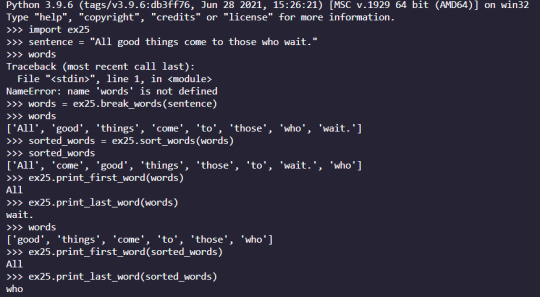
As I was working through calling the different functions in the terminal I realized that I missed a function - specifically the one that sorted a sentence. I called it and ended up getting a mess of individual letters. After bug hunting I found the issue to be that I called sort_words(sentence) instead of sort_words(words)

After fixing those issues I finished running through the function calls in the terminal and it went great!

Up next is Exercise 26! We are halfway through the book and it is time for a test. We are given broken code that we copy paste into a file. Our job is to fix it and get the program running! As I went through the program I left comments wherever I was fixing code. Below is my finished and fixed program.
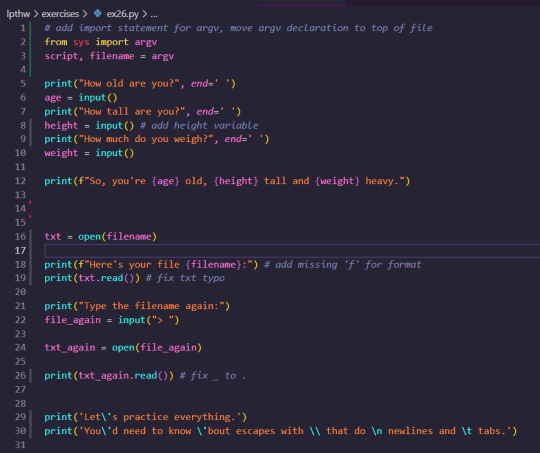

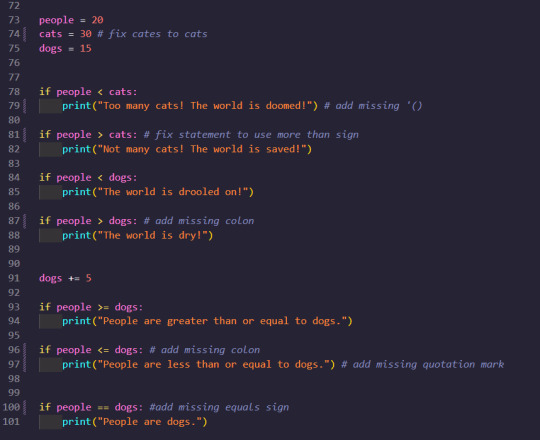
And here is the output in the terminal:

Exercise 27 went over different booleans as well as a chart to memorize. The next practical was exercise 28 where you type in different statements then guess if they will be true or false. With my previous experience in programming I already knew a lot - the only thing that tripped me up was NOT OR booleans. Here's the output of the terminal!

Chugging right along to Exercise 29! ex29 introduced if statements. I already know lots about if statements from Javascript so this is more of a refresher than anything.
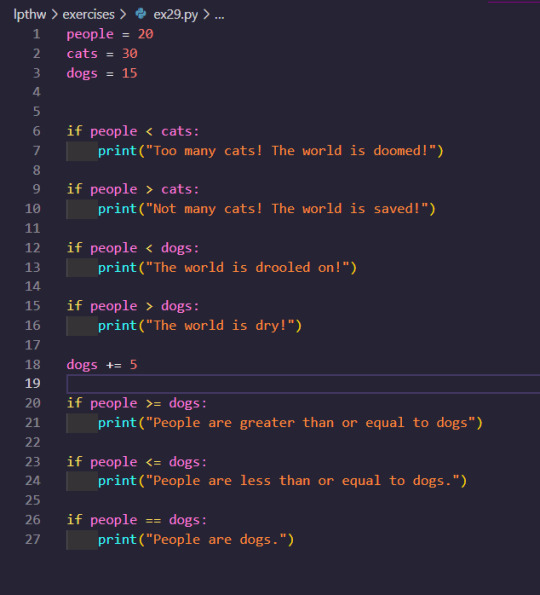
And then the output:

Exercise 30 introduces Else If statements.

And the output:

Exercise 31 combines everything that we've learned about If/Elif statements with the new concept of Nested statements. Using nested statements we are able to write a very simple Choose Your Own Adventure text game.
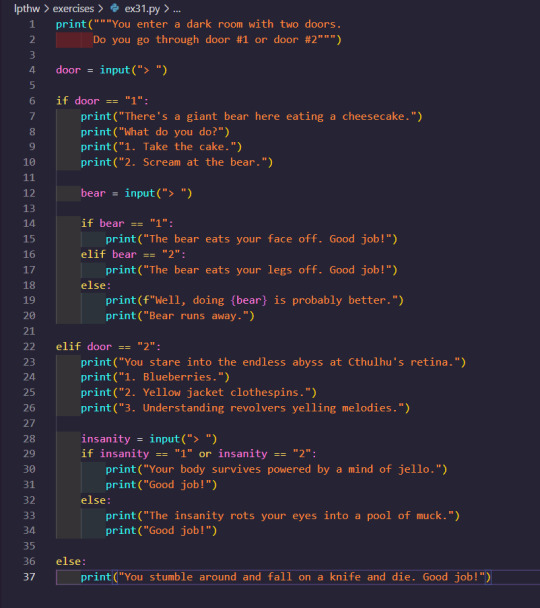
Here are a couple different runs I did with this program. My first try was not the best - I ended up having my mind turned into Jello!

My second run went better! I ran into a bear but I survived.

For the study drill it challenged me to write my own text game. I made a very simple one and got about halfway through where I want it to be.

That's it for today folks!
#learn python with f.m.#learn to code#lpthw#python#learn python#codeblr#coding#code#programming#transgender programmer#image undescribed
6 notes
·
View notes
Text
Blog Overview
Hello! So glad to see you here. Let me explain what this is to me and what you should expect.
Here is where I will write about all my tech related projects. I want to improve my technical writing skills, keep track of my progress, as well as interact with the communities here on Tumblr. I work a couple of jobs alongside my classes so, my posts headings will range from research, cyber security focused, to reblogging other peoples posts that I deem relevant. I hope you enjoy your time here!
Headings to Know
Education: Anything related to my education. I find that posting the general outline of what I am doing helps keep me motivated to be productive, so for the most part, anything under this title will be an update on school work.
Reading Notes: If I am reading a good book, and I find a quote or something that I want to write about it will be under this label.
Disclaimers
If you are looking for aesthetic, wrong blog.
Feel free to interact but, the instant it gets weird ~blocked~
I will make mistakes and will never claim to be the best. Everyone has something to learn.
Retired Headers
Research: [ No longer employed here ] I work as an undergraduate research assistant for one of my professors. Here is a link to find more about the specific project I work on and my role in the project.
SOC: [ No longer employed here ] I work at my universities Security Operations Center, whose main focus is on DevSecOps as well as alert response and triaging. Please note that some of the stuff I post under this heading will be made intentionally vague, due to the nature of the work.
Artificial Intelligence (AI): [ Left program early due to time commitment ] Starting May 2024 I will be taking courses to learn how AI works. It starts with a deep dive into Python, specifically machine learning Python libraries. After that, there will be a Machine Learning Labs and then group projects for the remainder of the Fall and Spring semesters. Hopefully, this will provide a good base for further learning.
#research#soc#eroz-codes#artificial intelligence#ai#devsecops#alert#triage#cyber security#codeblr#productivity#education
3 notes
·
View notes
Text
Exploring Game-Changing Applications: Your Easy Steps to Learn Machine Learning:
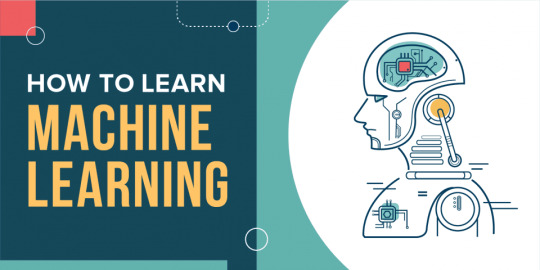
Machine learning technology has truly transformed multiple industries and continues to hold enormous potential for future development. If you're considering incorporating machine learning into your business or are simply eager to learn more about this transformative field, seeking advice from experts or enrolling in specialized courses is a wise step. For instance, the ACTE Institute offers comprehensive machine learning training programs that equip you with the knowledge and skills necessary for success in this rapidly evolving industry. Recognizing the potential of machine learning can unlock numerous avenues for data analysis, automation, and informed decision-making.
Now, let me share my successful journey in machine learning, which I believe can benefit everyone. These 10 steps have proven to be incredibly effective in helping me become a proficient machine learning practitioner:
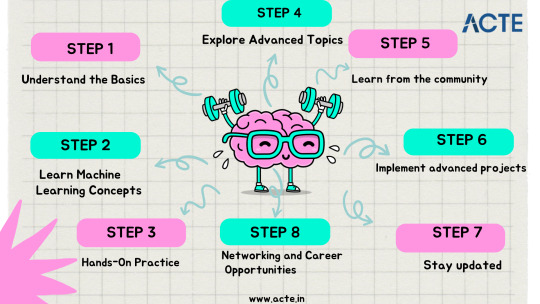
Step 1: Understand the Basics
Develop a strong grasp of fundamental mathematics, particularly linear algebra, calculus, and statistics.
Learn a programming language like Python, which is widely used in machine learning and provides a variety of useful libraries.
Step 2: Learn Machine Learning Concepts
Enroll in online courses from reputable platforms like Coursera, edX, and Udemy. Notably, the ACTE machine learning course is a stellar choice, offering comprehensive education, job placement, and certification.
Supplement your learning with authoritative books such as "Hands-On Machine Learning with Scikit-Learn, Keras, and TensorFlow" by Aurélien Géron and "Pattern Recognition and Machine Learning" by Christopher Bishop.
Step 3: Hands-On Practice:
Dive into real-world projects using both simple and complex datasets. Practical experience is invaluable for gaining proficiency.
Participate in machine learning competitions on platforms like Kaggle to challenge yourself and learn from peers.
Step 4: Explore Advanced Topics
Delve into deep learning, a critical subset of machine learning that focuses on neural networks. Online resources like the Deep Learning Specialisation on Coursera are incredibly informative.
For those intrigued by language-related applications, explore Natural Language Processing (NLP) using resources like the "Natural Language Processing with Python" book by Steven Bird and Ewan Klein.
Step 5: Learn from the Community
Engage with online communities such as Reddit's r/Machine Learning and Stack Overflow. Participate in discussions, seek answers to queries, and absorb insights from others' experiences.
Follow machine learning blogs and podcasts to stay updated on the latest advancements, case studies, and best practices.
Step 6: Implement Advanced Projects
Challenge yourself with intricate projects that stretch your skills. This might involve tasks like image recognition, building recommendation systems, or even crafting your own AI-powered application.
Step 7: Stay updated
Stay current by reading research papers from renowned conferences like NeurIPS, ICML, and CVPR to stay on top of cutting-edge techniques.
Consider advanced online courses that delve into specialized topics such as reinforcement learning and generative adversarial networks (GANs).
Step 8: Build a Portfolio
Showcase your completed projects on GitHub to demonstrate your expertise to potential employers or collaborators.
Step 9: Network and Explore Career Opportunities
Attend conferences, workshops, and meetups to network with industry professionals and stay connected with the latest trends.
Explore job opportunities in data science and machine learning, leveraging your portfolio and projects to stand out during interviews.
In essence, mastering machine learning involves a step-by-step process encompassing learning core concepts, engaging in hands-on practice, and actively participating in the vibrant machine learning community. Starting from foundational mathematics and programming, progressing through online courses and projects, and eventually venturing into advanced topics like deep learning, this journey equips you with essential skills. Embracing the machine learning community and building a robust portfolio opens doors to promising opportunities in this dynamic and impactful field.
9 notes
·
View notes
Note
Hi Loa! I'm also in the UoPeople's Computer Science program. What do you think about the program so far? Personally, I think some of the assignments are a bit weird and am not a huge fan of the amount of discussion posts we have to do. I'm also surprised we don't really have lectures. Sorry, I'm not sure how to end this ask but I'm just happy to see that someone I follow is in the same program as me!
Hey it’s totally fine to ask! I found the assignments very weird as well? The resources they have are good in my opinion, I like the Python book they recommended us to read and use for the assignments!
The parts I found weird was the discussion section. For those reading and don’t know UoPeople way of teaching, there’s no live lectures (which I think both me and Anon hoped there would be), and to get some grades you need to post a forum post and have to reply to other 4 people’s post as well to get a pass. And I assume that’s for all of the mini courses within the main course. I found that very odd.
Unfortunately that put me off, plus things at work got busy because it’s going to the summer period and things naturally get busy for insurance companies at that time so I personally had to drop out. But the main reason was because I didn’t like the styling of the why they conduct the teaching. It’s:
Do a mini assignment
Make a forum post about the said assignment
Reply to 4 people’s other assignments
Do another essay-like assignment and sent that one to the “lecturer”
Personally I don’t like studying or learning like this. Was definitely put my comfort zone and not the good kind unfortunately!
Best of luck to you but if you double don’t like it, email your personal portal, there should be a little box with ‘Advisor’ and their name. Email your Advisor that you’re thinking of dropping out. I did that and in the process, like I’m not even doing the work anymore at all. Haven’t logged in for days now! Anyhoo, best of luck!
The important thing is we both tried an opportunity out! Now I don’t have regrets like “Oh I should have tried UoPeople out…” nope! I tried it out, I didn’t like it and I move on!
Always good to try things, then regretting not trying.
9 notes
·
View notes